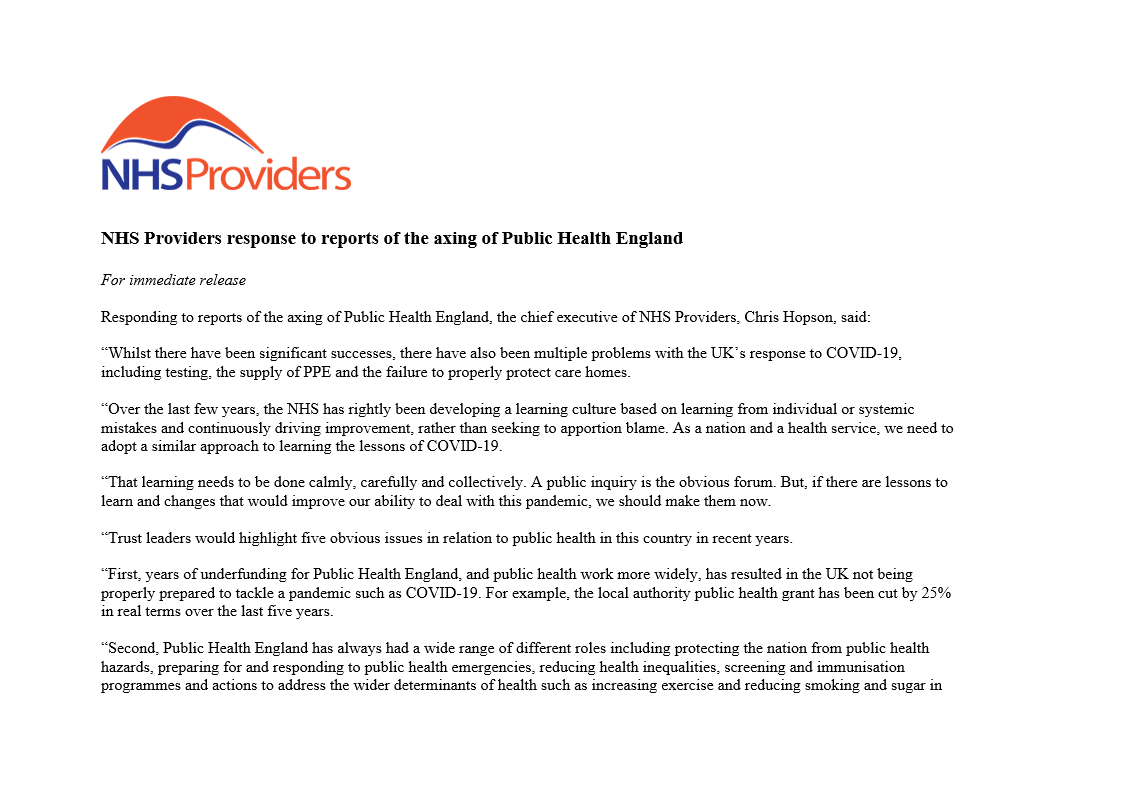
1/14 Front page story from @thesundaytimes on how NHS treated patients in first phase of covid-19. We think it's given an inaccurate and misleading picture of what happened. Initial thread below. Gathering more detail from members to add to a blog later this week.
2/14 Article alleges NHS was routinely excluding elderly patients from hospitals / intensive care during first phase of covid-19. Evidence includes routine usage of triage tool to deny critical care & not admitting care home patients. Trusts tell us this is incorrect.
3/14 Some facts from an NHS trust perspective. 1.The NHS did not run out of critical care capacity at any point during the first phase of covid-19. Critical care capacity remained available to everybody who would benefit from it. The key is the concept of “benefit from it”.
4/14 It's important to remember the key clinical principle that every patient should be given the best care appropriate to their individual medical needs. We know that not everyone with covid-19 was best treated in a hospital or a critical care or intensive care unit.
5/14 The best therapy for most Covid-19 patients in hospitals has actually turned out to be oxygen therapy which can be given on a general ward. We also know that, sadly, for some patients, ward or home based palliative care was the best available clinical option for their needs.
6/14 2. The NHS did not formally change the way it made decisions about who got admitted to critical care beds. There was categorically no blanket national decision to refuse care to any group of people, including on the basis of their age. This simply didn't happen.
7/14 Work on the so-called triage tool was never completed and it was never formally issued as it wasn’t needed. The trusts we have spoken to today do not recognise the statement in today's story that it was widely used across the country.
8/14 3. Data from @ICNARC shows thousands of over 60’s were treated in critical care and owe their life to that care. Over half of ICU admitted covid-19 patients were aged 60+ throughout whole pandemic. ICU covid age patterns consistent with patterns pre-covid too.
9/14 We understand why newspapers want to use individual case studies and anecdotes to illustrate a story. But extrapolating from those to general statements about what the NHS was doing as a whole, without robust system level data and evidence, carries significant risk.
10/14 We also know that anecdotes from individual frontline staff can sometimes lack context and perspective, e.g. the formal relevant trust policy. The interpretation of at least three of the anecdotes / case studies used in the story is contested by the trusts concerned.
11/14 We should also balance any individual distressing case studies with the thousands of stories from older patients whose lives were saved from covid-19 by the 'incredible NHS'. Here, for example, is one from the ever wonderful @MichaelRosenYes: theguardian.com/lifeandstyle/2…
12/14 I agree with @NHSEnglandNMD that “These untrue claims will be deeply offensive to NHS doctors, nurses, therapists and paramedics, who together cared for more than 110,000 severely ill hospitalised Covid-19 patients during the first phase”......
13/14 ...Nobody is asking that we place the NHS on a pedestal immune from criticism or challenge. We all know there is much that needs to be improved and much to learn. But we owe it to frontline staff to be balanced and evidence-based when making damaging claims like this.
14/14 Nit pick. The use of the phrase “health authority(ies)” in an English context is incorrect. They were abolished in England on 31 March 2013 as part of the Health and Social Care Act 2012.
• • •
Missing some Tweet in this thread? You can try to
force a refresh




